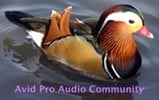
Avid Pro Audio Community
How to Join & Post • Community Terms of Use • Help Us Help YouKnowledge Base Search • Community Search • Learn & Support
 |
Avid Pro Audio CommunityHow to Join & Post • Community Terms of Use • Help Us Help YouKnowledge Base Search • Community Search • Learn & Support |
|
|||||||
|
|
Thread Tools | Search this Thread | Display Modes |
|
#10
|
|||
|
|||
|
To the original issue/cause here. If you suspect the USB stick put it aside or throw it out. Check that the problem is not something you are doing wrong, e.g. copying files while Pro Tools or another application might still be writing the files. Not properly unmounting a USB stick before removing it from a computer likely causes most corruption with those devices.
NTFS on Windows and HFS+ on Mac (and in future APFS will be even better) are more robust filesystems than FAT32 or EXFAT. Archive backup volumes should be on NFTS or HFS+ (APFS in future) not EXFAT or FAT32. EXFAT can be a handy filesystem to use on a USB transfer stick, but don't rely on that a backup. Quote:
There is a much much rarer concern in computer systems storage design about exotic forms of silent data corruption. Not something to worry here. Quote:
Your primary protection against data loss is having backups. SSDs might complicate the discussion because they are much more complex to understand internally that a HDD. But to the end-user they operate similarly. Good quality SSDs should have higher-reliability than HDD when used for active storage, for offline/archive storage you want to use a HDD. Don't put backups or archives in SSDs they are not intended for long-term powered off storage, but that is an active area of R&D. For a HDD or SSD if SMART is reporting errors throw it out. Nobody here should really be worrying about deeper details of how drives work. What you should be worrying about is you backup and recovery plan, what failures you are protecting against (disk drive failure, building failure (e.g. fire, earthquake), theft, etc.) and testing both the backups and recovery actually work. You likely should be using different methods to backup boot/system drives and to make archives of sessions. And think about how far you want to be able to roll back either of those. And don't have just one active backup, the classic time for things to go South is when you are trying to write the backup and the read of the parent disk fails, now you have a failing disk and a possibly half-overwritten useless backup. Ad similar for archives, if something is missing it might also be missing. And the most common cause of data loss is *not* disk failure, its the idiot user. So you want to think though what happens if you accidentally delete lots of audio content out of some sessions. And don't notice for weeks, has your backup plan overwritten all those useful old backups with the later now useless new session folder by the time you notice? etc. You need multiple separate backups, ideally some stored off-site and/or in the cloud, and on different types of media. NAS systems can be fantastic as one of the things to archiving to (but don't rely on having all eggs in one basket). Last edited by Darryl Ramm; 10-27-2017 at 10:01 PM. |
|
|
 Similar Threads
Similar Threads
|
||||
| Thread | Thread Starter | Forum | Replies | Last Post |
| Missing Audio Files in Session Copy | jshiffma | Pro Tools 12 | 5 | 06-20-2017 03:43 AM |
| Save Copy as without Audio Files | force76 | Pro Tools 11 | 3 | 11-20-2014 09:06 AM |
| How to copy audio files not in session folder? | jchan | macOS | 2 | 04-18-2014 05:29 AM |
| Help! PT wants to copy all audio files PT10-PT9 | evs | Post - Surround - Video | 2 | 07-23-2012 12:17 PM |
| How do I copy and paste audio files? | tioluis | Pro Tools TDM Systems (Mac) | 4 | 07-01-2007 10:22 AM |